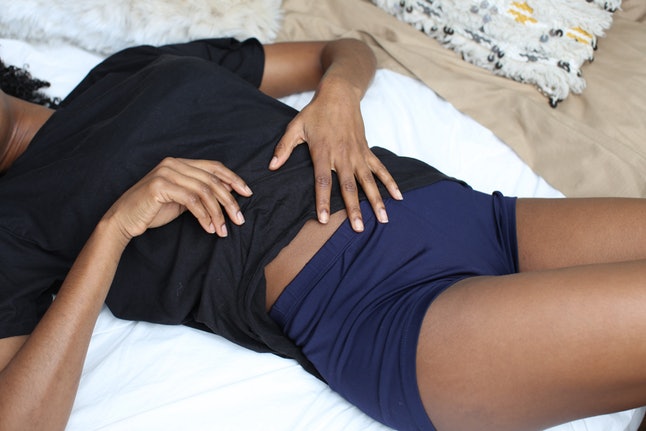If you’ve ever had penetrative sex, chances are it hurt the first time, or was at least a little uncomfortable until your body adjusted. The next time you did it, things probably went a little smoother. While it’s totally normal to feel uncomfortable during sex at the beginning, there are definitely types of discomfort during sex to be aware of, according to experts.
“The truth is, no kinds of sex should be painful with the exception of sex that is intended for that reason, such as some BDSM activities,” sex and relationship therapist Cyndi Darnell, tells Bustle. “Painful sex in general means that something is not as it should be.” Even if you aren’t necessarily in pain, but just feel physically uncomfortable during sex, this could mean that it’s time to make some adjustments so that things become more pleasurable.
If you’ve tried to make some changes yourself and are still uncomfortable, don’t hesitate to seek professional help. “Any problem that isn’t easily resolved with lubricant, a change in position, or more foreplay needs to be checked out by a gynecologist,” Stephanie Buehler, MPW, PsyD, CST-S, a licensed psychologist and AASECT-certified sex therapist at Hoag for Her Center for Wellness, tells Bustle. The sooner you reach out the better, she says, because that can not only make you feel physically better, but also prevent potential anxieties about sex or relationship problems. “Women shouldn’t feel embarrassed or guilty if something is going on with their body that makes intercourse difficult because problems are pretty common,” Dr. Buehler says.
Here are some issues you should be sure to speak up about, according to experts.
1. A Burning Sensation In Your Vagina

Rule of thumb: if any part of your genitals burns, it’s probably time to investigate. If you’re sure that you don’t have an STI, a sensation of burning or rawness with penetration may be due to vestibulodynia (a type of vulvodynia) or vaginismus, Heather Jeffcoat, DPT, a pelvic floor physical therapist, owner of Femina Physical Therapy, and author of Sex Without Pain, tells Bustle. “Women with vaginismus will often describe their symptom ‘Like my partner is hitting a wall,'” she says. “They don’t always describe it as pain, but more of an inability to have penetrative intercourse, and in severe cases, tampon insertion.” Seek the help of a licensed and trained pelvic floor physical therapist for help addressing your sexual discomfort through techniques like dilation and stretches, Dr. Jeffcoat says.
2. Urethral Burning

“If there is urethral burning during or after sex (or the feeling of a urinary tract infection), Painful Bladder Syndrome may be to blame,” Dr. Jeffcoat says. The syndrome, like a UTI, includes needing to pee more frequently, which the Official Foundation of the American Urological Association suggests is seven times per day. See a doctor to check whether you have a bladder irritation and to seek further treatment.
3. Vaginal Canal Pain

“If you feel pain deep in your vaginal canal during penetrative thrusting (in which you are the receiving partner), this could be a sign of an ovarian cyst or possibly endometriosis,” says Dr. Jeffcoat. Watch out for other potential signs of endometriosis such as painful menstrual cramps or spotting between periods. While medical assistance is recommended, she says that penis depth limiters are great devices to reduce pain you feel deeper in your vaginal canal in the short-term. “Pelvic floor physical therapy to address overactive muscles and reduce pain should also be implemented to address the source of the pain,” Dr. Jeffcoat says.
4. A Headache During Sex

“Believe it or not, there is such a thing called a sex headache,” certified personal trainer and health and wellness expert for Maple Holistics, Caleb Backe, tells Bustle. Although it’s fairly rare to experience headaches as a result of sexual activity, they can become debilitating. “In fact, the most common type of sex headache is an orgasm headache, which occurs during sexual climax,” he says. “Like many other headaches, the severe pain is brought on by a spike in blood pressure and the resulting dilated blood vessels.”
5. Pain In Certain Positions

Any kind of extreme twisting and bending during sex can be pretty uncomfortable, but if you have a tipped uterus (one which can lie in several positions in the body), this can be exacerbated. “Women who have a retroverted uterus (20 to 30 percent of women) that [an OB/GYN] might call ‘tipped’ or ’tilted’ can lead to the cervix being in a different position,” Dr. Jennifer Landa, board certified in obstetrics and gynecology and the chief medical officer at BodyLogicMD, tells Bustle. That can make sex uncomfortable. This is an issue that most likely occurs with rear entry positions and deep thrusting because the penis will be closer to the cervix, she says. But a quick position switch could potentially remove any discomfort. Try letting the partner being penetrated be on top so that they can control the depth of penetration, says Dr. Landa.
6. Pain At Your Vaginal Opening

“Vulvodynia is a chronic pain syndrome that affects a woman’s vulva,” says Dr. Landa. “Usually it causes pain and tenderness right around the opening of the vagina with no obvious cause.” The exact cause is unknown, but it seems to occur more frequently in women who have had a history of multiple infections, like yeast infections, she says. See your doctor for treatment to help control the pain.
7. Sore Spots

If you have warts or sores on your genitals that are uncomfortable or even painful, you might have a sexually transmitted infection like herpes or genital warts, says Dr. Landa. These can produce painful lesions that make sex uncomfortable, so if you notice new bumps that aren’t usually down there, see your gynecologist for treatment. You could have an ingrown hair, but it’s definitely best to check.
8. Vaginal Dryness

If you’re being penetrated by a penis or a toy, being properly wet is key to keeping things moving smoothly and preventing any uncomfortable chafing. If you’re experiencing vaginal dryness and aren’t using any lubricants, you might be uncomfortable during sex. Dr. Rebecca Brightman, a private practice OB/GYN and educational partner for SpeakENDO, tells Bustle that tracking when you experience symptoms can help you and your doctor figure out what’s causing it. You might just need extra foreplay or you may be dryer than usual due to where you are in your menstrual cycle.
Don’t assume that discomfort during sex is something you’ll just have to deal with. If you aren’t feeling how you usually do or are having trouble having sex, it’s definitely worth investigating.
Source: Bustle


















































